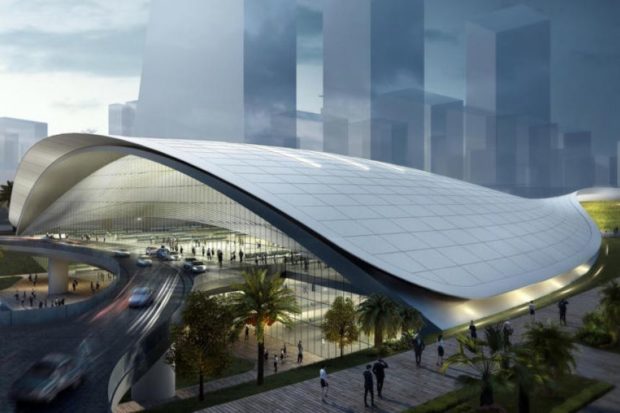KL-Singapore High Speed Rail terminated after both countries fail to reach agreement

An artist’s impression of the High Speed Rail Terminal in Jurong East for the terminated project. FARRELLS via The Straits Times/Asia News Network
SINGAPORE — The Kuala Lumpur-Singapore High Speed Rail (HSR) project has been terminated, after both countries failed to reach an agreement on changes proposed by Malaysia by the deadline of Dec 31.
Prime Minister Lee Hsien Loong and his Malaysian counterpart Muhyiddin Yassin announced this in a joint statement on Friday (Jan 1) morning.
The statement said the Malaysian Government had proposed several changes to the HSR project in the light of the impact of the Covid-19 pandemic on the Malaysian economy.
“Both Governments had conducted several discussions with regard to these changes and had not been able to reach an agreement. Therefore, the HSR Agreement had lapsed on 31 December 2020.”
The statement said both countries will abide by their respective obligations, and will now proceed with the necessary actions, resulting from the termination of the HSR Agreement.
Article continues after this advertisementSingapore’s Ministry of Transport, in a separate statement, said Malaysia had allowed the HSR bilateral agreement to be terminated, and has to compensate Singapore for costs already incurred, in accordance with the agreement.
Article continues after this advertisementThe joint statement added: “Both countries remain committed to maintain good bilateral relations, and cooperate closely in various fields, including strengthening the connectivity between the two countries.”
PM Lee and Mr Muhyiddin had held talks on the twice-delayed bilateral project via video conference on Dec 2, after Malaysia earlier proposed some changes.
Both sides then said they would announce further details on the HSR Project through a joint statement in due course.
But the writing had been on the wall, following several Malaysian news reports that quoted unnamed sources saying the Malaysian Cabinet was planning to continue the project without Singapore’s involvement and end the line in Johor.
The statements issued on Friday did not detail the compensation amount that Malaysia has to pay Singapore.
But in July 2018, then Transport Minister Khaw Boon Wan had said in Parliament that Singapore had already incurred costs including for consultancies to design civil infrastructure, manpower to oversee the project and also land acquisition.
Based on preliminary estimates then, this was estimated to have already exceeded $250 million by the end of May 2018, he said, adding that Singapore would continue to incur costs – more than $6 million in June, more than $6 million in July, and at least $40 million from August to the end of 2018.
When Singapore agreed to the suspension that Malaysia requested in August that year, more costs were incurred to compensate contractors for breaking contracts, and to fill back sites already excavated, for instance. Mr Khaw told Parliament in October 2018 that Malaysia had agreed to reimburse Singapore $15 million for these abortive costs, to be paid by end-January 2019.
The 350km rail line, which both sides agreed to build in 2013, was to have run from a terminal station in Bandar Malaysia in downtown Kuala Lumpur to a terminal in Jurong East.
The HSR was slated to have seven stations, and would have cut travel time between Kuala Lumpur and Singapore to 90 minutes, compared with over four hours by car and about five hours end-to-end by air.
Both countries signed a legally-binding bilateral agreement on the project in Putrajaya in December 2016, witnessed by Prime Minister Lee Hsien Loong and then Malaysian Prime Minister Najib Razak.
Singapore commenced work on the project, including appointing a firm to design its HSR infrastructure and later calling an international joint tender with Malaysia for an assets company.
The project was later suspended at the request of Malaysia, after a change in the Malaysian government following the May 2018 general election.
The initial two-year extension in September 2018, which was to have ended in May 2020, was extended for a second and final time till Dec 31.